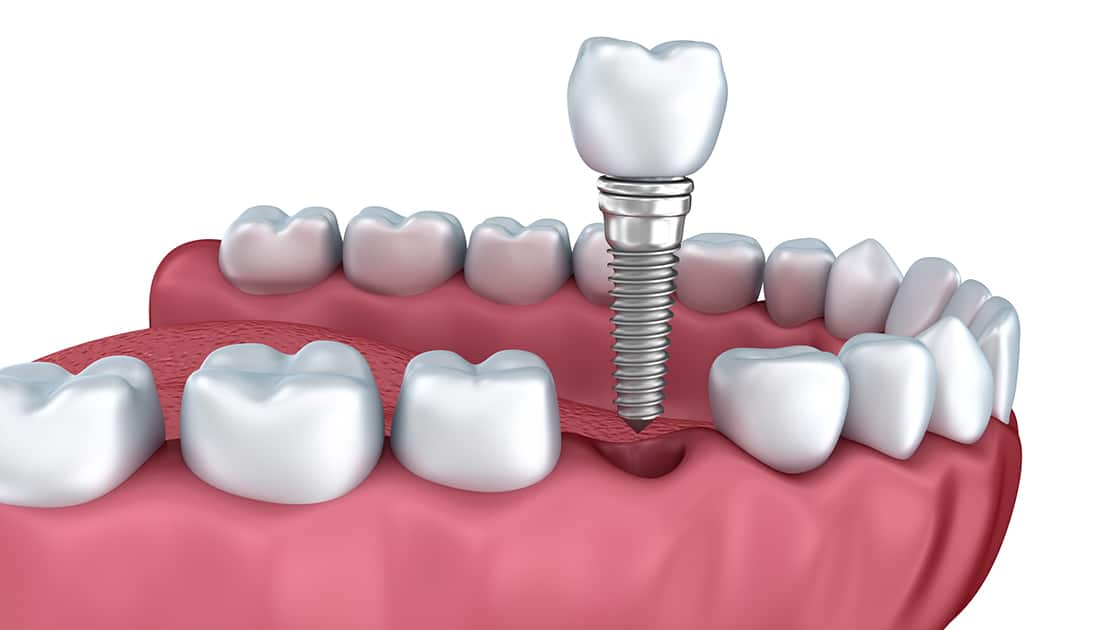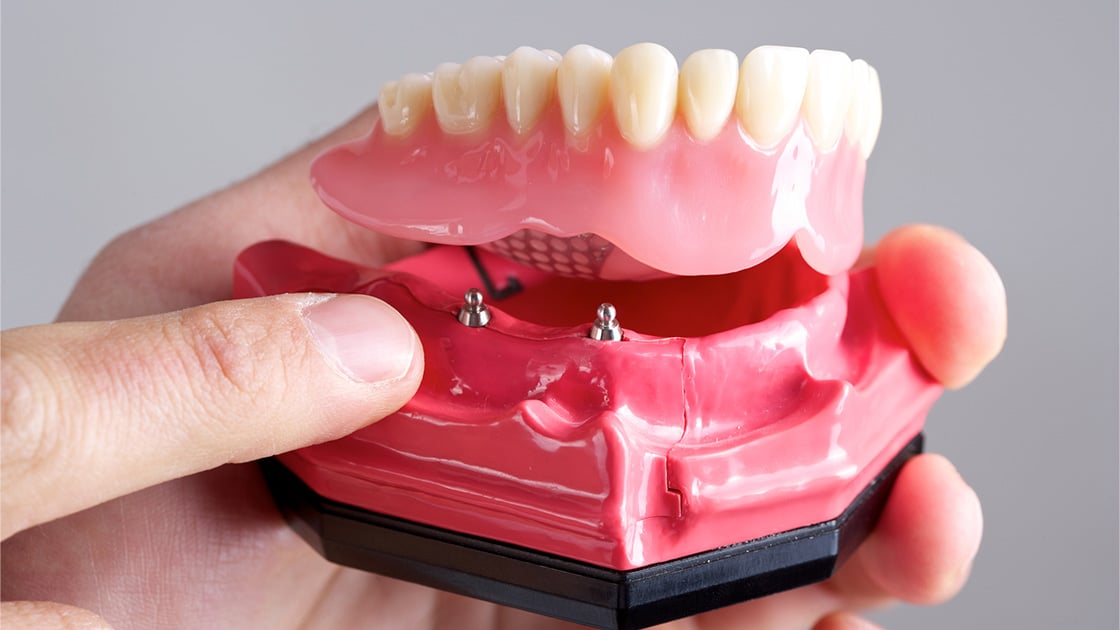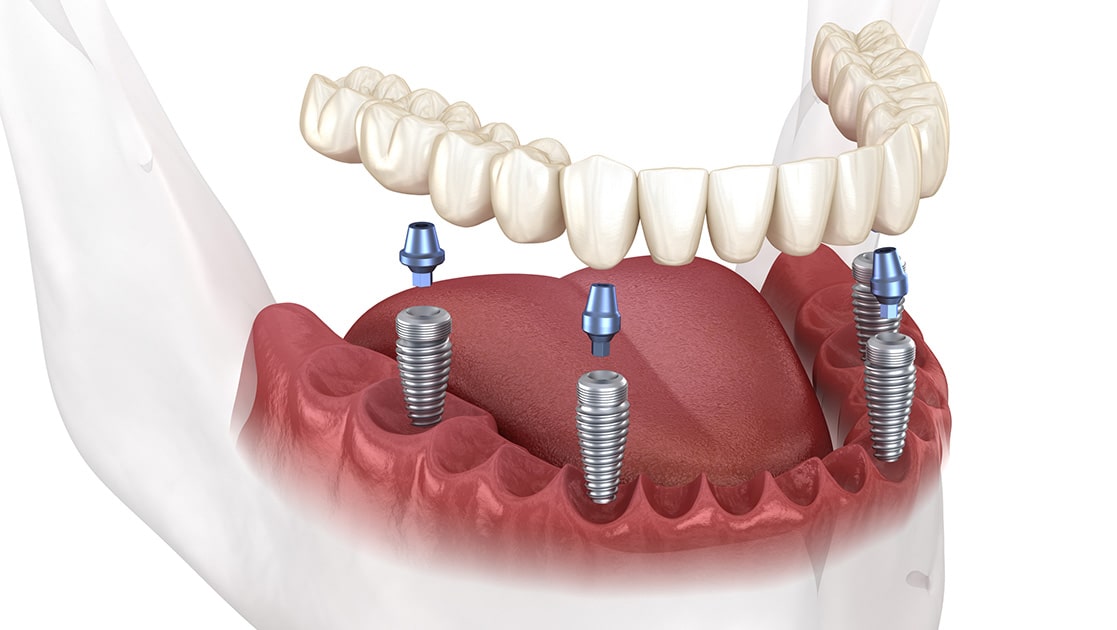
Excellent Dentistry provides dental implants for patients in Mundelein, Vernon Hills, Libertyville and surrounding suburbs in Northern Illinois. To learn more about implant dentistry, call 847-566-7850 or schedule an appointment directly online.
Benefits of Implant Dentistry
Dental implants are considered to be the highest quality tooth replacement option due to the following benefits:
Types of Dental Implants
Single Tooth Implants


What are the Advantages of Implant-Supported Overdentures?
Implant-supported overdentures provide significant advantages, including enhanced stability and comfort, as they are anchored to implants. Lower dentures often have instability and movement caused by the very strong tongue muscles. Implant-supported overdentures provide increased retention, minimizing the slipping and discomfort often associated with traditional dentures. They help preserve jawbone density by stimulating the bone, reducing bone loss. Overdentures also improve chewing efficiency and speech clarity, closely mimicking natural teeth. Unlike traditional dentures, they do not require adhesives and offer a more secure fit. The implants help maintain facial structure and aesthetics, preventing the sunken appearance often seen with tooth loss. Overall, implant-supported overdentures offer a durable, comfortable, and functional solution for individuals seeking an effective and removable alternative to traditional dentures.

What are the Advantages of Fixed Hybrid Dentures?
Fixed hybrid dentures offer numerous advantages, including superior stability and comfort, as they are securely anchored to dental implants, eliminating issues of slipping and discomfort. A fixed denture is essentially a brand new, permanent smile that looks and functions as close to natural teeth as possible. They enhance chewing efficiency and improve speech clarity, closely mimicking the function of natural teeth. These dentures help preserve jawbone density, reducing bone loss and maintaining facial structure. Unlike traditional dentures, they do not need to be removed for cleaning at home, simplifying oral hygiene. Additionally, fixed dentures on implants provide a natural-looking and aesthetically pleasing smile. Overall, they offer a durable, functional, and comfortable solution for individuals seeking a reliable and long-lasting alternative to removable dentures.
The Dental Implant Process: Step-by-Step
- Initial Consultation: Dr. Beckerman conducts a comprehensive oral examination, including x-rays and 3D imaging, to assess bone density and determine implant candidacy.
- Treatment Planning: Based on the examination, a personalized treatment plan is created, detailing the number of implants needed and their placement.
- Implant Placement: Using local anesthesia, Dr. Beckerman surgically places the dental implant into the jawbone. The implant serves as the root for the replacement tooth.
- Osseointegration: Over the next 3-6 months, the implant fuses with the jawbone through a process called osseointegration, providing a stable foundation for the artificial tooth.
- Abutment Placement: Once osseointegration is complete, an abutment is attached to the implant. The abutment connects the implant to the replacement tooth.
- Customized Tooth Restoration: Impressions of the mouth are taken to create a custom replacement tooth that matches the color and shape of natural teeth.
- Final Restoration: The custom replacement tooth is attached to the abutment, completing the dental implant procedure.
- Post-Operative Care: Dr. Beckerman provides detailed instructions for post-operative care, including managing discomfort, maintaining oral hygiene, and scheduling follow-up appointments.
- Follow-Up Visits: Patients are scheduled for regular follow-up visits to monitor the healing process and ensure the implant is functioning properly.
- Long-Term Care: Patients are advised on long-term care of their implant, including maintaining good oral hygiene, regular dental check-ups, and avoiding habits that can damage the implant.
- Emergency Services: Dr. Beckerman and the team at Excellent Dentistry are available for any postoperative emergencies or concerns related to the dental implant.
Are You a Good Candidate for Dental Implants?
To be a good candidate for dental implants, it helps to have teeth that have not been missing for long or that are ready to be extracted and replaced. Over time the support structures for missing teeth (alveolar and jaw bone) will be resorbed, or dissolved by the body. If this occurs, the jaw cannot support a dental implant.
However, there is still an option for patients with bone loss in the jaw. Bone grafting is a procedure used to replace missing bone tissue in the jaw and encourage regeneration. This can prepare the jaw for dental implants.
For patients with inadequate bone density in the upper back jaw, sinus lift procedures can be performed to elevate the sinus floor and provide a solid support structure for dental implants.
Why Choose Excellent Dentistry?
At Excellent Dentistry we believe in providing the highest quality dental care at all times for every patient. Dental implants are the latest technology in tooth replacement, providing a high functioning, natural looking option for patients. Guided placement technology allows us to place dental implants with optimal precision and accuracy for the best chance of success. We also use the highest quality dental implants that are known to last.
Our dental implants can support an entire arch of upper or lower replacement teeth, providing a permanent solution for replacing all the teeth in your mouth.
We consider our patients to be family, greeting you with a warm welcome at each visit to our office. Our comfortable, relaxing atmosphere will help you feel at ease. With TVs in every treatment room, you can watch your favorite shows on Netflix or YouTube while you receive dental care.
Frequently Asked Questions About Implant Dentistry
Contact Us
To learn more about dental implants, call 847-566-7850 to schedule an appointment in Mundelein, IL, or book directly online.
